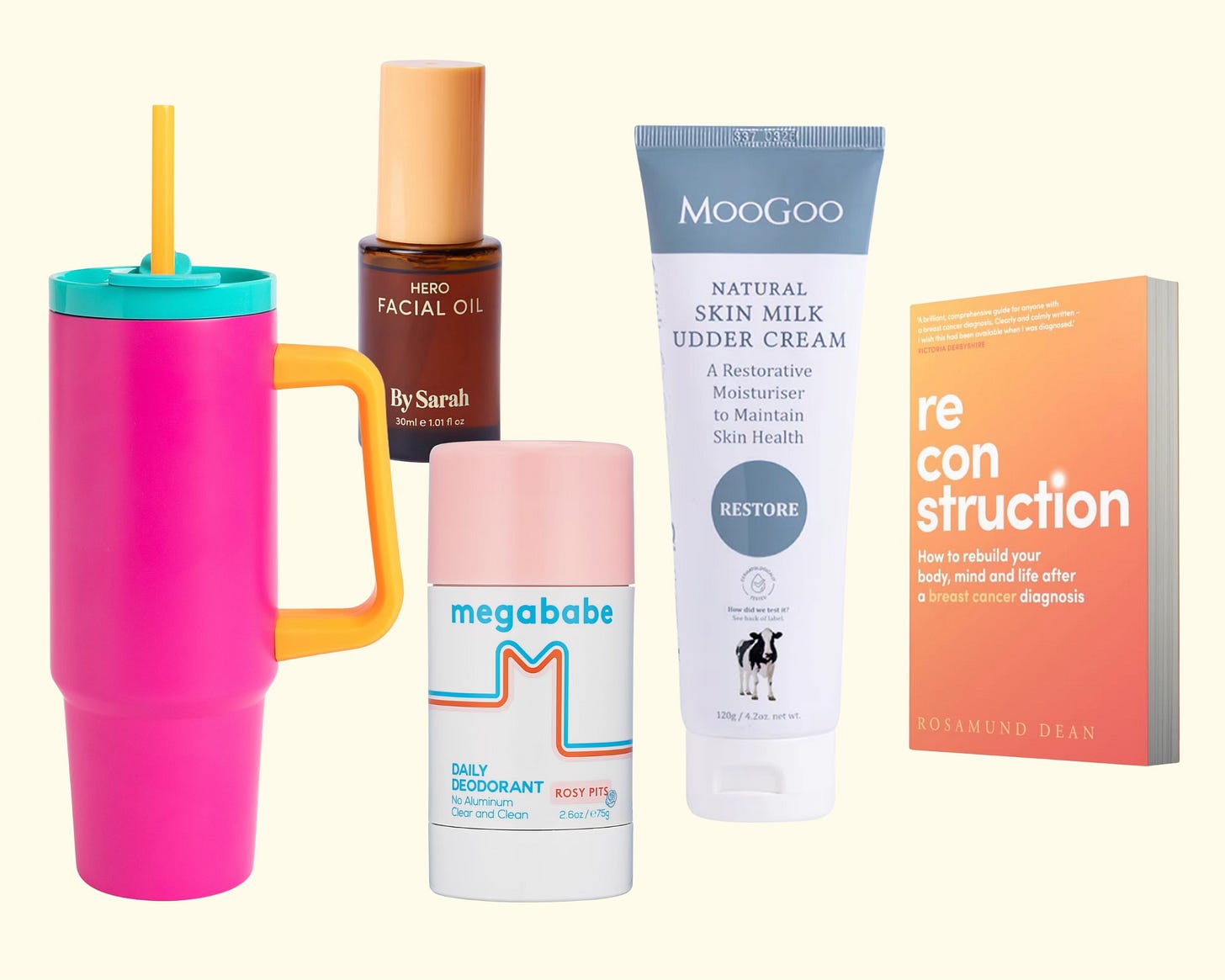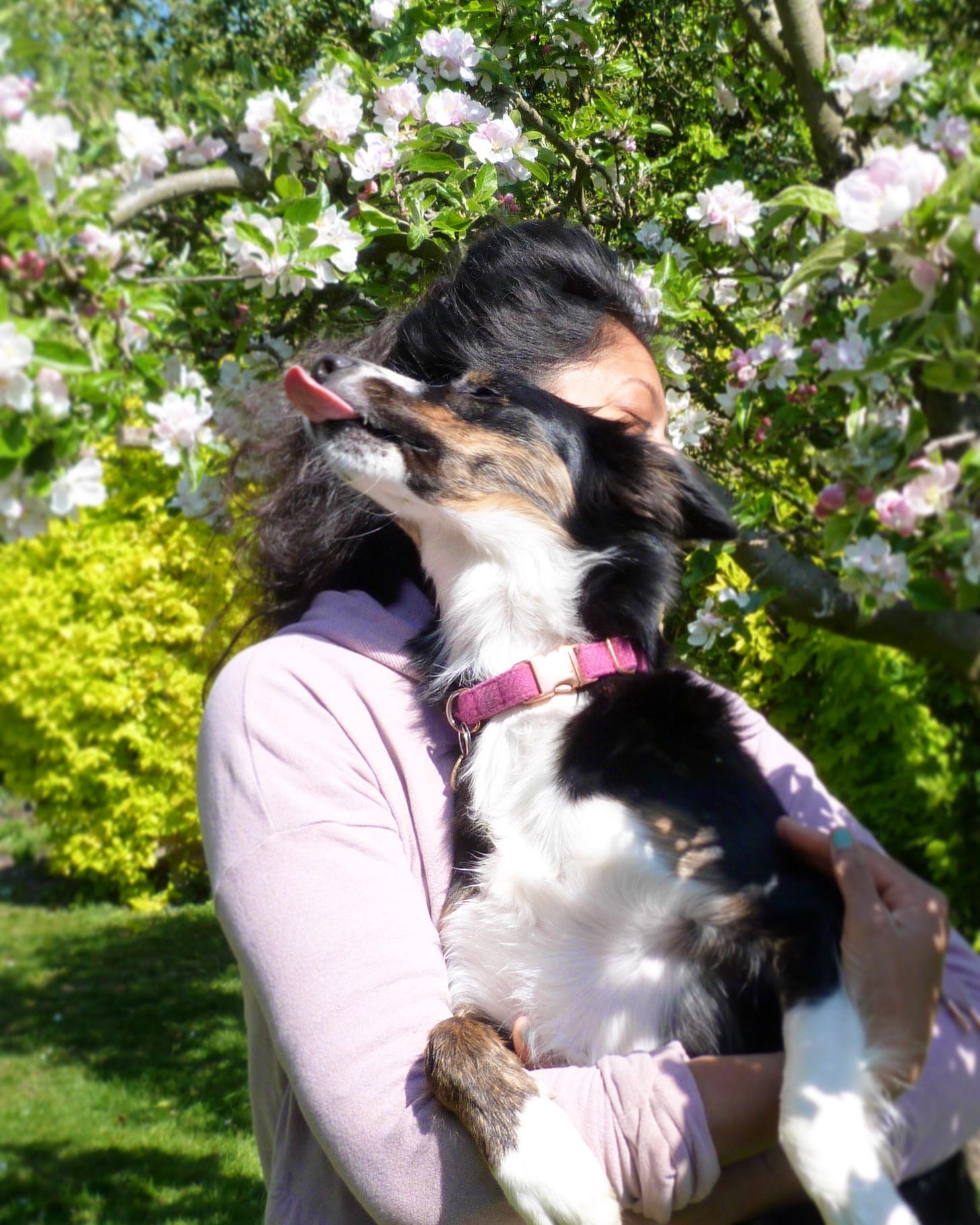This is piece is part three of my breast cancer treatment tips/diagnosis story: you can find the earlier instalments here on diagnosis, and here on tips for hospital visits.
At a university awards ceremony some twenty years ago, I was awarded a prize: ‘Best bust in a corset’. Was I offended? Nope! I accepted with unfeigned delight, dressed in one of my favourites - a pale pink linen corset with silk ribbons & silk-covered buttons. Back then I had a thing for dressing either like the lead boy in a pantomime - frilled shirt, cropped trousers, high boots and fishnets (daywear) or Marie Antoinette (eveningwear). I had a watered-silk corset in the palest pistachio green - it was so beautiful. A standard greeting in our Edinburgh flat? ‘Ah - you’re dressed as Lord Byron again’. Good times.
Anyway, as you know, half of the bust which won that coveted award let the team down, let itself down, got brought out on a platter while I was etherised on a table. Yadda yadda, old news.
Funnily enough, the least bad part of the whole thing was the radiotherapy - possibly because of all the good advice I received and followed. I’m sharing it now in case you or anyone you know might find it helpful - obviously I hope neither is the case, but from previous posts know that some of you are - which is, as we can all agree, bloody unfair.
Leaflet fatigue
If you’ve been through the rigmarole of diagnosis, hospital appointments and treatments, you’ll know that you get handed a leaflet for everything. EVERYTHING. Chemotherapy? Pink leaflet. Mental health? Green leaflet. Explaining cancer to your children? Binned leaflet. Obviously the leaflets are trying to be helpful, but honestly, they ended up floating in the boot of my car, jumbled with dog bowls and escaped compost.
Google is NOT your friend - try not to torture yourself on it. Breast Cancer Now, Macmillan or the NHS website are your go-tos for general radiotherapy information. Rosamund Dean’s book Reconstruction, which I’ve mentioned before, has a chapter on it - incredibly helpful, reassuring advice in a friendly, meticulously researched voice.
Other people who have been through this are also invaluable sources of information - I shouted out on Instagram for breast cancer radiotherapy advice before mine started, and had so many helpful replies as follows:
Drink water, and then more water
Literally everyone said this - like the more the better. One correspondent said her sister was up to 5 litres per day through radiotherapy - challenge accepted! (Bear in mind this water advice doesn’t apply to all types of cancer radiotherapy - pelvic particularly - please check with an actual nurse or doctor for your individual case.) I’ve shouted out to my favourite Stanley cup knock off before, but it’s so cute it’s worth another mention - this one, £10 from Sainsbury’s.
Skincare
Your skin can - unsurprisingly - get dry, irritated and worse through radiotherapy. You shouldn’t put any moisturiser on at all for two hours before treatment, but the rest of the time, and immediately after, knock yourself out.
The official advice was that any kind of moisturiser will do. But MooGoo Udder Cream (what a name!!) was the favourite from people who wrote in to me, with a lot of recommendations for Weleda calendula lotion & aloe vera cream, and to use unscented products, both for skincare and laundry detergent.
I used the MooGoo or organic aloe vera lotion religiously up to two hours before radiotherapy, immediately after and then reapplied a few times a day, down to twice a day once radiotherapy was finished. I also used By Sarah London Hero oil on my face and the treatment area at night (it was formulated by a woman creating skincare for her sister going through cancer treatment, so you know the ingredients are good) - anyway, whether it was the water, the MooGoo or the Hero Oil, my surgeon in the follow up clinic was astonished at how normal my skin looked after radiotherapy, like actually really good. (I used the Hero Oil on the kids’ super dry faces too in winter, and they looked lovely and glowy afterwards - recommend.)
SPF 50+
I’m sorry to say - on top of the already bad ‘you have cancer!’ shocker, you will need to use factor 50 sunscreen from your ribcage up to your collarbone for the next couple of years after radiotherapy. (This is a useful reminder for me as well, as I tend to stomp into the garden to deadhead the roses in summery dresses, completely forgetting about the sunscreen. Bad.)
Deodorant
I’m not, and nor do I plan to go down the ‘is ordinary deodorant carcinogenic’ internet rabbit hole, but I figured it couldn’t hurt to switch from regular to ‘natural’ deodorant after surgery and through radiotherapy, and quite a few readers said they felt similarly. The problem with so-called natural deodorant? Most of it is SHIT. Aesop and Malin & Goetz included. Avoid avoid.
But I found the holy grail - Megababe is both natural and AMAZING. I’m going to buy another six for the apocalypse box. One application and you’re good for the day - including tube journeys and overheated work events.
Exercise vs fatigue vs rest
This is such a weird one, because you might feel totally wiped out by the radiotherapy, but as Rosamund & countless others point out, light exercise can actually mitigate fatigue. Getting a walk in everyday, or keeping up with part of your regular exercise routine through radiotherapy and even chemotherapy can help you feel better - and as research which has just been published shows, exercise helps reduce the risk of cancer recurrence too*. Light exercise is key at this stage of treatment though, not major cardio if you’re not a habitual exerciser.
That said - everyone, EVERYONE, will tell you to rest, too! So it’s like - do the exercise, and also do all the resting. While holding down a job, and quite possibly wrangling children, or children and a dog, and driving to hospital and back for the radiotherapy. Where exactly are you going to fit in a rest?
If at all possible, schedule in an afternoon nap while friends/family/DBS checked acquaintances look after your children. And my biggest tip - while not the best at meditation, I started doing yoga nidra deep relaxations through all of this. You spend the whole 20 minute practice lying down, under a blanket, and it’s THE most relaxing thing - perfect if you have a short window to rest, and don’t want to spend it scrolling/thinking about all the things you need to get done. I learned how to do it from Natasha at MotherHealth Coaching, and find her voice incredibly soothing to listen to - big recommend. As a bonus, and not to sound too woo, it helps you really connect with how your body feels - I have since found it easier to ‘listen in’ and work out what it is my body needs in terms of rest or movement. There’s even research showing that yoga nidra reduces cortisol levels - while lying down!
Stretching
If you’ve had any axillary node surgery, it's so important to keep stretching throughout and after radiotherapy - you might need a good physio to help out, and this is something I really wish I’d done more of - one side is definitely still stiff almost a year later. I was lazy. Don’t be me.
Food
Everyone knows the whole 30 plants a week thing, even my 3 year old has got on the ‘eat the rainbow’ bandwagon. More than ever, through radiotherapy it’s a really good time to eat more green leafy veg, polyphenol rich colourful fruit and vegetables (this includes 70%+ dark chocolate, and coffee!) plenty of protein from chickpeas, legumes, tofu, omega-3 rich fish, nuts and seeds, extra virgin olive oil, etc. Eat pomegranates like they’ll be the first casualty of the supply chain breakdown. And, boring, cut down or cut out the booze. I like the Zoe or M&S multi-seed mixes as porridge or pasta toppers, or make up one myself with poppyseeds, flax, chia, sesame & random chopped nuts. (I now top all my old Roasting Tin recipes with this at home as well as the suggested crunchy topping, it’s an easy addition.)
It’s the usual advice - fewer processed foods, more scratch cooking. Because you’ll have so much time to cook with all the structured rest and exercise and hospital appointments, which brings me to:
Get help
Plenty of people might have made you ‘anything I can do?’ offers - these are well meant, but it’s really unlikely that you’re going to text Dave from work to ask for a crispy baked gnocchi on a particularly crappy evening. But - and this is for anyone who is a pal of someone going through treatment - friends who turn up at the door unasked with home-made chocolate brownies, or send a gift box of ready-to-cook Cook meals, or tell you they’re coming all the way down from Lancashire or Scotland to look after your kids & dog so you can rest are THE ACTUAL BEST.
If you can get over the awkwardness of saying ‘Well, actually - yes!’ when someone says ‘Let me know if there’s anything I can do?’, then ask them to bring you a meal. You will not regret not having to cook. (This is the time to channel your inner Michelle Obama. I loved this clip.)
Chemotherapy
I can’t pass on personal experience, as test results suggested that chemotherapy wasn’t necessary as part of my treatment. But both Rosamund’s book and Professor Robert Thomas’s, which I’ve written about before, have really helpful information and in-depth advice for coping with side-effects. One of Professor Thomas’s recommendations was for Polybalm, which reduces the damage to nails during chemotherapy. (I bought it for a friend as a gift, along with a nice silk eye mask.)
One year after
Other than the general level of knackered from having young children with erratic sleep, things seem relatively normal now? If I do another one of these posts, it’ll be on the ongoing hormone treatment for breast cancer. Early menopause, woo!
Physically, the arm is a bit stiff from erratic post-radiotherapy stretching, and today’s Guardian article has galvanised this bookish sofa-slob/sporadic gardener to get back to the routine suggested by a health coach for ongoing post-cancer care. This looks like:
a brisk walk a couple of times a week (rather than just standing still & lobbing a ball for the dog)
weight bearing exercise - for me that’s a Joe Wickes menopause workout every other day (they are amazing - it’s like having a personal trainer in your living room, if your personal trainer were a labrador)
stretching/light yoga after the kids go to bed
maybe some reformer pilates?
I adore swimming, particularly if the pool rocks oligarch nuclear-bunker vibes, but the clientele at my gym is getting increasingly sketchy, to the point that on my last visit there was a bloke who I’m pretty certain was taking the equivalent of upskirting photographs in the sauna, aimed at women wearing swimsuits. URGH. (Yes, I have written a strongly worded email to Third Space.) Now I have to workout at home to YouTube videos, sharing my yoga mat with the dog, who thinks both of us should be on it at the same time because she’s made of velcro. AARGH.
Thank you so much for reading (and getting all the way to the end!) If you think this post might be useful to other women going through the radiotherapy part of their breast cancer treatment, please do hit the ❤️ button - it helps with visibility on Substack etc. Wishing you a lovely week ahead - back to garden content next week!
xx Mini








Such good advice!
The exercise point is a really good one. It is so tempting not to take any when you are suffering from fatigue. I battle with this almost daily and would say that in particular taking several short walks instead of one long one is the way to do it. I have to be really ill - bed bound with a fever - not to manage it and always feel better afterwards even if I’m tired. I do one when I wake up, pre eating anything (very good for you - from everything from blood sugar control to curbing inflammation) then after every meal. Resistance training too - when we hit peri menopause keeping up muscle strength is so hard but so important! Stronger muscles = easing of any symptoms including fatigue but very hard to regain once lost. I worry for everyone on weight loss injections because of this. Not sure a lot of them realise.
I'm amazed that I was working at Edinburgh university when you were a student and didn't see either Pantomime Boy or Marie Antoinette in George Square. Either would have brightened my day.
Lots of good recommendations for life in general. I'm a great fan of Weleda Baby Calendula face balm for winter. Also their non-aerosol spray deodorant in citrus or sage. Slipped up on sun screen today - thanks for the reminder.
Sending lots of good health wishes.